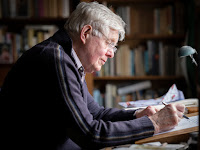"Garton Ash addresses the thicket of countervailing opinions and actions with superior skill and clarity. But what to do about blatant deceit and bluster, the poison which menaces democracy?"
Are you sitting comfortably?
It’s complicated: Europa, (Greek ‘wide-eyed’) beautiful maiden carried off to Crete by a priapic Zeus as a bull, there raped to give birth to a man who will become king of Crete. The story darkens … his wife, enamoured of a bull (genes will out?), bears a hybrid man-bull, the Minotaur, for whom a labyrinth is constructed as a lair. Lying Brexiters darkened their own mendacious hybrid story to construct another labyrinth in their own detested Europe.
Europe, the subterranean maze and how to find the way out into the light…Garton Ash hints how. He began his exploration of Europe, the fact and the idea, as a student in East Germany and recounts his experiences as a western youth in the eastern world in The File, also his delving into the voluminous files assembled by the countless informers feeding the Staatssicherheit STASI including their surveillance dossier on him. The information gathered by the army of secret police snoops – more per capita of population than any other undercover agency – often delivered risibly inane details: ‘Today, Frau Mecklenburg took her two attractive daughters to Mass,’ (told me by one of those daughters).
Garton Ash travelled widely, made lasting friendships with young men and women destined, like him, to share in uniting the diverse nations of post-war Europe, his ‘kaleidotapestry’, to establish a peace that had eluded Europe for aeons: in varietate concordia, among them a fiery radical Viktor Orbάn now an unashamed, intransigent illiberal populist.
His study is far-reaching. He outlines the way political and economic forces within Europe are at odds and how this complicates the central issue of common purpose; the rise of terrorism, extremism, populism, a concatenation of -isms which challenges received wisdom, and maybe should. There is, too, the growing problem of refugees and belligerence stirring antagonistic attitudes, the proliferation of the various means of lying, distorting fact in spurious claim, fake news, social media, a hostile press bereft of journalistic integrity … the dream of solidarity which led to the miracle of an apparently united Europe collides with ever-tightening new tensions that threaten the very reverse. Garton Ash addresses the thicket of countervailing opinions and actions with superior skill and clarity. But what to do about blatant deceit and bluster, the poison which menaces democracy? Populism has surged on to dominate in a way not seen since before the war, and the security of common purpose lies exposed by disregard for the general good against the individual gain. Garton Ash does not skip over this perilous trend and proffers no answer because, perhaps, there is none. Nationalism has its place and it was so long denied to the oppressed and the overridden. Flag-waving by those who never did anything to earn it merely serves, often, to mask their own personal agenda whilst pleading quite another cause, that of ‘the people’. But in those countries of the great territory of Europe which were for centuries treated as mere grabs by nations of power, being recognised as part of a union is of deep significance: it brings them home, their home. The lies bandied about by English politicians to dupe an electorate into supposedly protecting their own ‘home’, its so-called ‘sovereignty’, make their professed defence of liberty, true belonging, as fought for and won, across the Channel, embarrassing if not downright shaming. In addressing the overlapping time-frames of post-war and post-Wall Europe, Garton Ash lays out the fact and circumstance as they influence human affairs, not in some abstract of political debate, but as indication of how urgently settling the matter of Europe was needed after so much bitter and nationalist conflict.
Prince Potemkin, from 1775 governor-general of Russia’s appropriated southern Black Sea provinces, made ports for the main Fleet, and ordered construction of painted façades of pretend villages (Hollywood film sets …?) populated by happy well-fed villagers to fool visiting officials. This concrete form of propaganda is now imitated by populists, (the NHS bus?) not only in Russia but in Hungary, Poland and, to a degree, in this country, by-passing democratic institutions and undermining the principles of a united Europe formed as a defence against the resurgence of authoritarianism, nationalism, corruption and conflict.
If you seek to understand more fully the multifarious Europe of which this nation, sans Empire, is and ought to be an integral part, verily our homeland, then read this captivating book, no matter the heartache and headache it may provoke, rich as it is in personal experience, insight and story written by someone who has studied Europe and lived it. Garton Ash is one of those rare historians who not only knows his subject but feels it, ‘wide-eyed’ indeed; the agreement that may emerge from various sources and people … in varietate concordia.
Homelands is published by The Bodley Head.


No comments:
Post a Comment